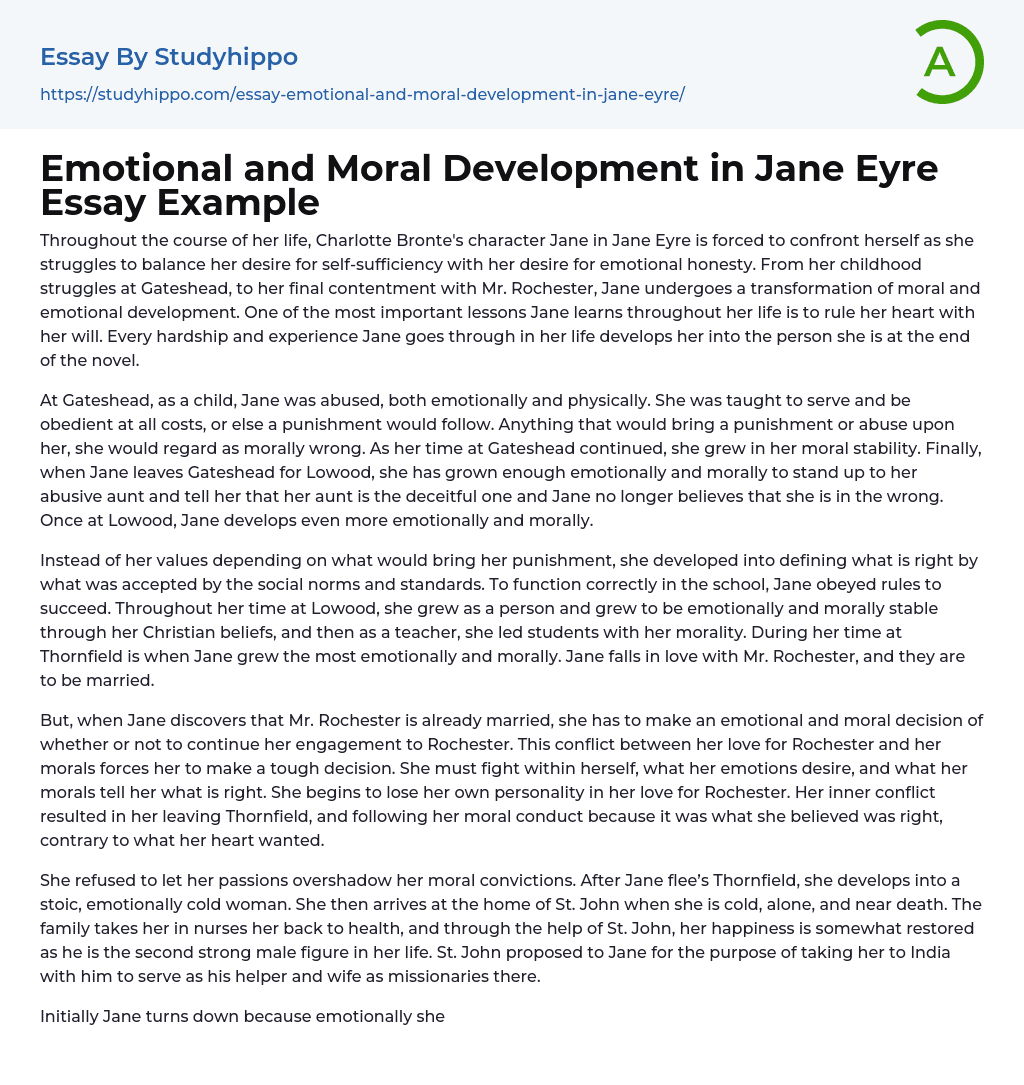Throughout the course of her life, Charlotte Bronte's character Jane in Jane Eyre is forced to confront herself as she struggles to balance her desire for self-sufficiency with her desire for emotional honesty. From her childhood struggles at Gateshead, to her final contentment with Mr. Rochester, Jane undergoes a transformation of moral and emotional development. One of the most important lessons Jane learns throughout her life is to rule her heart with her will. Every hardship and experience Jane goes through in her life develops her into the person she is at the end of the novel.
At Gateshead, as a child, Jane was abused, both emotionally and physically. She was taught to serve and be obedient at all costs, or else a punishment would follow. Anything that would b
...ring a punishment or abuse upon her, she would regard as morally wrong. As her time at Gateshead continued, she grew in her moral stability. Finally, when Jane leaves Gateshead for Lowood, she has grown enough emotionally and morally to stand up to her abusive aunt and tell her that her aunt is the deceitful one and Jane no longer believes that she is in the wrong. Once at Lowood, Jane develops even more emotionally and morally.
Instead of her values depending on what would bring her punishment, she developed into defining what is right by what was accepted by the social norms and standards. To function correctly in the school, Jane obeyed rules to succeed. Throughout her time at Lowood, she grew as a person and grew to be emotionally and morally stable through her Christian beliefs, and then as
teacher, she led students with her morality. During her time at Thornfield is when Jane grew the most emotionally and morally. Jane falls in love with Mr. Rochester, and they are to be married.
But, when Jane discovers that Mr. Rochester is already married, she has to make an emotional and moral decision of whether or not to continue her engagement to Rochester. This conflict between her love for Rochester and her morals forces her to make a tough decision. She must fight within herself, what her emotions desire, and what her morals tell her what is right. She begins to lose her own personality in her love for Rochester. Her inner conflict resulted in her leaving Thornfield, and following her moral conduct because it was what she believed was right, contrary to what her heart wanted.
She refused to let her passions overshadow her moral convictions. After Jane flee’s Thornfield, she develops into a stoic, emotionally cold woman. She then arrives at the home of St. John when she is cold, alone, and near death. The family takes her in nurses her back to health, and through the help of St. John, her happiness is somewhat restored as he is the second strong male figure in her life. St. John proposed to Jane for the purpose of taking her to India with him to serve as his helper and wife as missionaries there.
Initially Jane turns down because emotionally she does not feel it is right to go to India and serve as his wife because she did not love him. But, then Jane did change her mind and agreed to
marry St. John to help serve because she felt it was morally her calling to serve Christ in any way possible. But, the closer the time came to leave for India, the more Jane felt her calling to be with Rochester, and her emotions took over. In the end, she goes back to be with Rochester and they end up together, albeit the disaster which finally brought their conflict to a close.
In the end, Jane finally finds a balance between her morality and her emotion. She becomes honest with herself emotionally to accept that being with Rochester is not immoral, and she is not forced to punish herself by being with a man in a situation she does not want. She is given the stability in herself as she marries Rochester and finds true happiness and peace. Jane Eyre develops from a small, child, only listening to her elders to avoid punishment, to growing into a mature adult who has a balance between her conscience and emotional ability to “rule her heart with her will”.
- 1984 essays
- A Farewell to Arms essays
- A Good Man Is Hard to Find essays
- A Hanging essays
- A Lesson Before Dying essays
- A Long Way Gone essays
- A Rose For Emily essays
- A Separate Peace essays
- A Tale Of Two Cities essays
- A Very Old Man With Enormous Wings essays
- Adventures Of Huckleberry Finn essays
- Alice in Wonderland essays
- All Quiet on The Western Front essays
- Allegory of the Cave essays
- An occurrence at owl creek bridge essays
- Animal Farm essays
- Anthem essays
- Antigone essays
- Arthur Conan Doyle essays
- As I Lay Dying essays
- Atticus Finch essays
- Barn Burning essays
- Battle Royal essays
- Beauty and The Beast essays
- Beloved essays
- Boo Radley essays
- Brave New World essays
- Candide essays
- Castle essays
- Characters In Hamlet essays
- Characters In Romeo And Juliet essays
- Christmas carol essays
- Chronicle of a Death Foretold essays
- Cinderella essays
- Crime and Punishment essays
- Daisy Miller essays
- Death of a Salesman American Dream essays
- Desdemona essays
- Diary Of A Wimpy Kid essays
- Dracula essays
- Dubliners essays
- Emma essays
- Ender'S Game essays
- Ethan Frome essays
- Eveline essays
- Fahrenheit 451 essays
- First-Person Narrative essays
- Fish Cheeks essays
- Frankenstein essays
- Genesis essays




